The Personal is Political
Words by Dr. Federica Caso
What do women think? Where do their brains wonder when they are given the time to be with themselves? What do their bodies feel when they can be present before the world? Women activists, artists, and thinkers insist that women’s personal experiences are framed by societal forces and norms, and that if we want to understand and change the world we need to grapple with these experiences.
The Personal Is Political is an exhibition that explores these questions, and the answers are intriguing to say the least! Women reflect on their experiences, and their connection to people, places, and the world. They worry about the state of the world and think about the sources of societal violence. They hope for a better future and act to create change.
Resident artist Deborah Eddy projects us into a domestic dystopia that shed light onto family violence. Feature artist Rebecca Piper looks into female sexuality, how it is perceived by women and society. Feature artist Ruby Barnsley speaks about connections, relationships, and vulnerability at the intersection of the personal and the political.
THE PERSONAL IS POLITICAL
Words by Chloe Marston
House Conspiracy’s first exhibition of 2020, The Personal is the Political, features works from resident artist Deborah Eddy and feature artists Rebecca Piper and Ruby Barnsley. Revealing the interconnectedness between ideas of femininity and sexuality within the contemporary political climate, The Personal is Political follows each artist’s exploration of personal, sexual, and domestic politics. Each artist utilises traditionally feminine domestic textiles, objects, and arts to explore the exhibition’s theme of the feminist intersection of the personal and political. Through intimate revelations of their own personal experiences, Deborah Eddy, Rebecca Piper, and Ruby Barnsley confront the impact of politics on the wider female experience.
Thematically, House Conspiracy’s The Personal is Political unifies the work of three individual female artists using traditionally female techniques into cohesive feminist statements regarding sexual politics. Within the framework of a house, each artist uses domestic objects including bedlinen, curtains, dresses, and ‘kitchenalia’ to reflect on the impact the political world has on the personal sphere. Through sharing vividly intimate and palpable experiences with viewers, Eddy, Piper, and Barnsley inspire viewer engagement with the intersecting ideas of femininity, politics, and social activism. The Personal is Political encourages an exploration of femininity and sexuality that takes into account a diverse array of equally valid perspectives: ultimately defining a sense of the systematic oppression of women and questioning modern understandings of what it means to be a woman in today’s society.
Working in house for six weeks, House Conspiracy’s resident artist Deborah Eddy has immersed herself in, and responded to, the house through her art which depicts a dystopian domestic environment where women are present yet not safe. Eddy’s art centres on domesticity, the role of the woman within the household, and addresses concerns of domestic violence. The textile versatility of Eddy’s art is evident, as she works with a vast array of materials including chux wipes, danger tape, high-visibility clothing, and more to create non-functional ‘kitchenalia’ which explores the expectations and realities of female domestic life. Domestic objects of curtains, ‘kitchenalia’ and knitted squares create a deliberately uncomfortable presence through the use of materials traditionally associated with more masculine and dangerous pursuits. A rug woven from zip ties is deliberately non-inviting and disturbing, and curtains are embroidered with infamous Vagina Dentata imagery to continue the uncomfortable atmosphere invoked in this vision of dystopian domesticity.
Upon entering the exhibition space, viewers are confronted with six small towers, each comprised of ten knitted squares of danger-tape pierced with knitting needles. Symbolically, Eddy juxtaposes the traditionally female-associated practice of knitting with danger-tape more common in the male-dominated construction industry. These sixty squares poignantly represent and commemorate the sixty women who are known to have died as a result of domestic violence throughout 2019. The sixty-first square remains incomplete as a reminder that the number of deaths as a result from domestic violence continues to grow. In addition to raising awareness of the impact of domestic violence on women, Eddy emphasises that of the sixty women murdered, nineteen were over fifty years old revealing that violence against women also impacts heavily on older women, who are another focus of Eddy’s art. Eddy uses non-functional woven ‘kitchenalia’ in a glass cabinet to explore the idea that older women are viewed as no longer useful in society, using elements of high-visibility materials to increase the visibility of women’s, and specifically older women’s, issues. These works, according to Eddy, draw attention to the invisibility of older women, critiquing the perception that as a women ages her usefulness, especially within the house, decreases. Immediately demanding attention within the space, Eddy’s art emphasises the importance of raising awareness on the role of women in society and on the effects of domestic violence.
Combining highly personal photography, poetry, and collage to critique the contemporary political climate, feature artist Ruby Barnsley delicately reveals the dichotomy of how the personal can become explicitly political through societal pressures and concerns. Beginning with a visualised personal diary, filled with memories of loved ones, Barnsley’s work acts as a celebration and appreciation of the impact of friendship on her life. Intimately respectful photographs are taken of each of her friends, showcasing the joys of being with them and the importance of women cherishing not only romantic relationships, yet platonic as well. This whimsical personalised visual diary, filled with collage, poems, and photographs, showcases Barnsley’s joyful experiences of travelling and adventures with her friends. Thematically, Barnsley’s visualised diary of intimate relationships focuses on the importance of connections, including non-sexualised ones, and their impact on women’s expressions of self.
Alongside this slideshow is a more directly political, and initially more obviously feminist, collection of clothing displayed with painted statements which speak boldly on feminism, sexuality, and environmental issues. Using calico dress mock-ups as a canvas for political statements, Barnsley reflects on expectations of female beauty, and the influence and impact of social media and politics, to create literal statement pieces which stimulate political discourse. Bold and satirical, statements such as “If he asks 4 ur no. tell him ur a 10” comment on societal pressures and norms for women, employment, the effects of social media, and politics. Although inherently comedic in tone, these statements reveal the intensity and impact of political issues today and how these effects remain omnipresent in what may seem to be casual and joyful lives. Declaring that the relationship between personal life and political or societal expectations always exists, however the choice whether to be defined by these pressures or defy them depends on the individual, Barnsley invites conversation into how personal lives, full of love and adventure, are impacted by societal pressures and political issues.
Continuing The Personal is Political’s thematic use of domestic items as a medium through which to explore feminist ideals, feature artist Rebecca Piper reveals intimate experiences related to twenty-first century female sexuality which began with a social media callout for personal responses to how female sexuality is perceived publicly and personally. Using these responses as the basis for interviews which shared personal experiences with femininity and sexuality, Piper found the results empowering in their extreme honesty and vulnerability and three of these experiences went on to form the focus of her artwork. Incorporating painting and video installation inspired by these honest accounts of modern femininity and sexuality, are six paintings on bedsheets which correlate to three interview responses. Projected over the paintings are specifically poignant words and statements which expose ideas of motherhood, sex, and womanhood from the intimate responses to Piper’s interviews. The first of the three responses emphasises the effects of motherhood on one’s own sexuality, as the respondent stated that being with children all day ultimately affected her sex life, as she strived to have a moment to herself. Women also opened up about the perceptions of sexuality, specifically bisexuality, and how being bisexual led to perceptions of disconnection and lack of acceptance by others. The final response comments directly on how others’ perception of femininity ultimately affected her own self-perception as she struggled to find her own identity. Piper explores the honesty and vulnerability of each personal experience on sexuality, womanhood, and motherhood to further understanding of how femininity is defined by people in themselves and others.
As a powerful, yet relatable, comment on contemporary femininity and feminist politics this intimate and personal exhibition makes a potent statement on the intersection of personal experience and the current political climate. The Personal is Political reveals how political and societal pressures and expectations shape the personal lives and experiences of women, and how this exhibition theme has individually resonated with each artist and unified them politically as women. Unified in their exploration of modern femininity and sexuality, Eddy, Piper, and Barnsley reveal the dichotomy between vulnerability and empowerment and the relationship between the two, as personal experiences and perspectives are combined to make powerful political statements on multiple issues affecting contemporary women. Exploring the female experience, each artist comments on different stages of women’s lives and different perspectives, focusing on a wide array of issues including personal connections, sexuality, the impact of politics, and domestic violence. United in House Conspiracy, each artist contributes an intensely personal and powerfully political insight into the experience of a diverse array of women, and offer an honest and vulnerable reflection on the theme of The Personal is Political.
SHOWCASE DOCUMENTATION
Click through to view event and artwork documentation
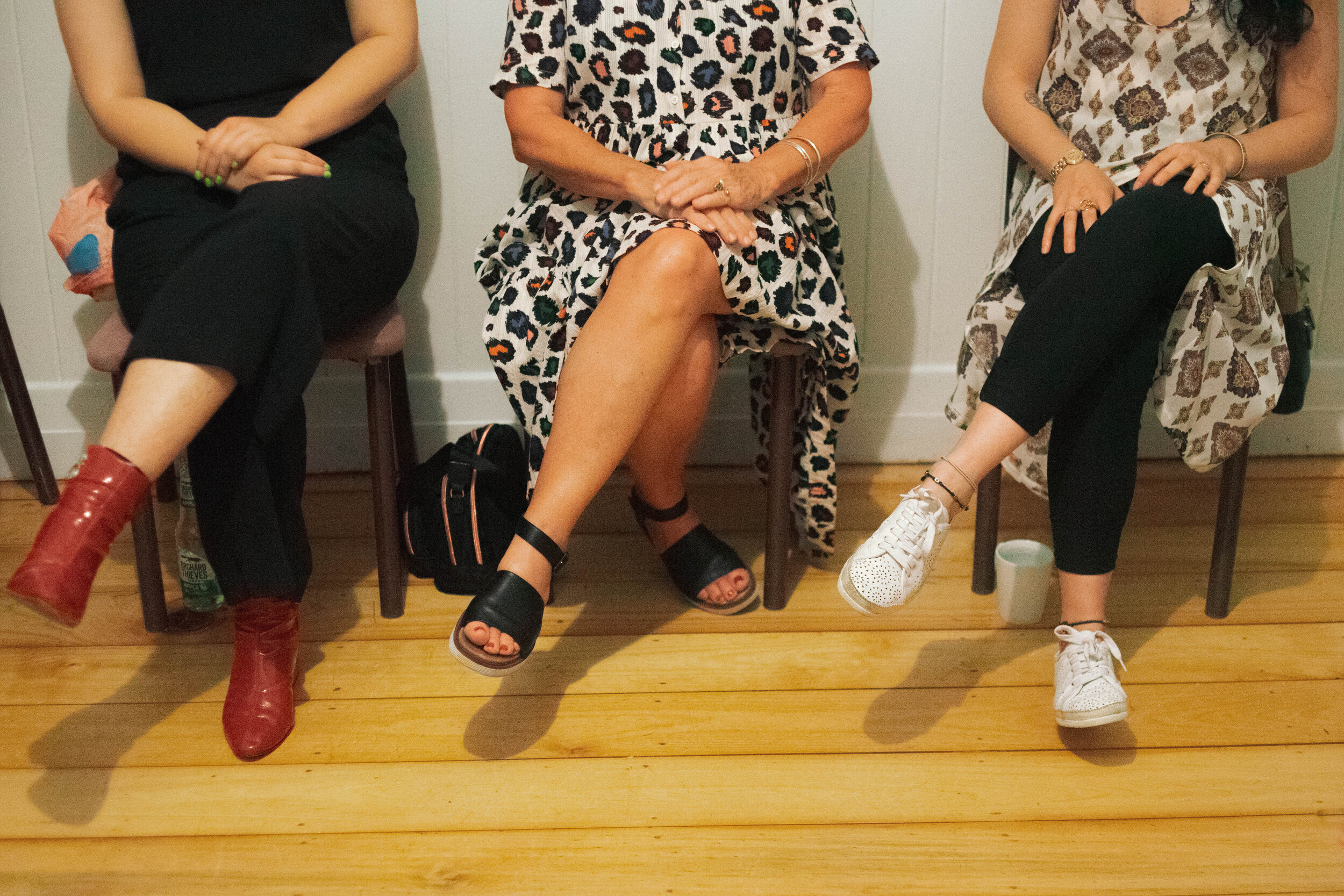
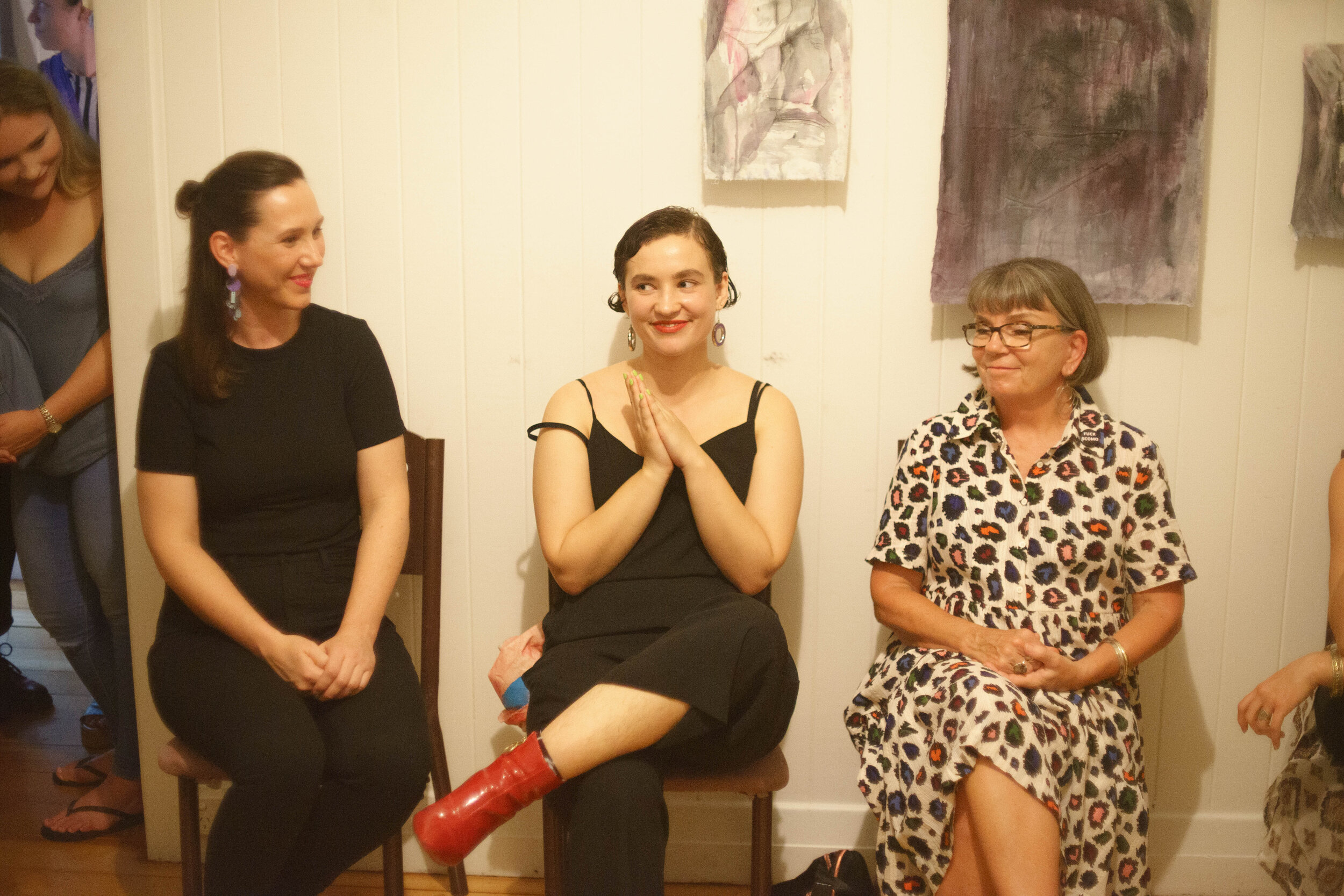
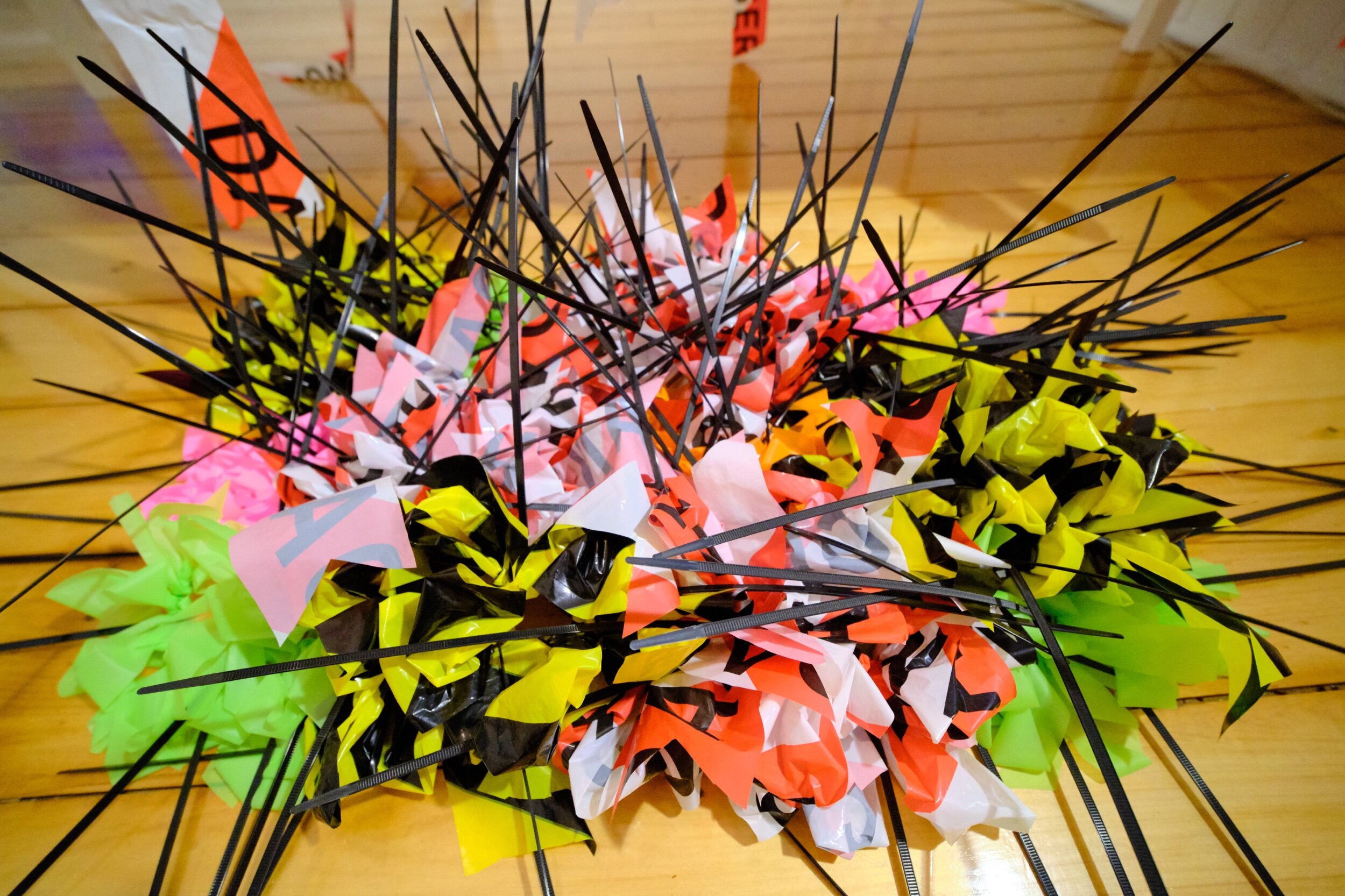
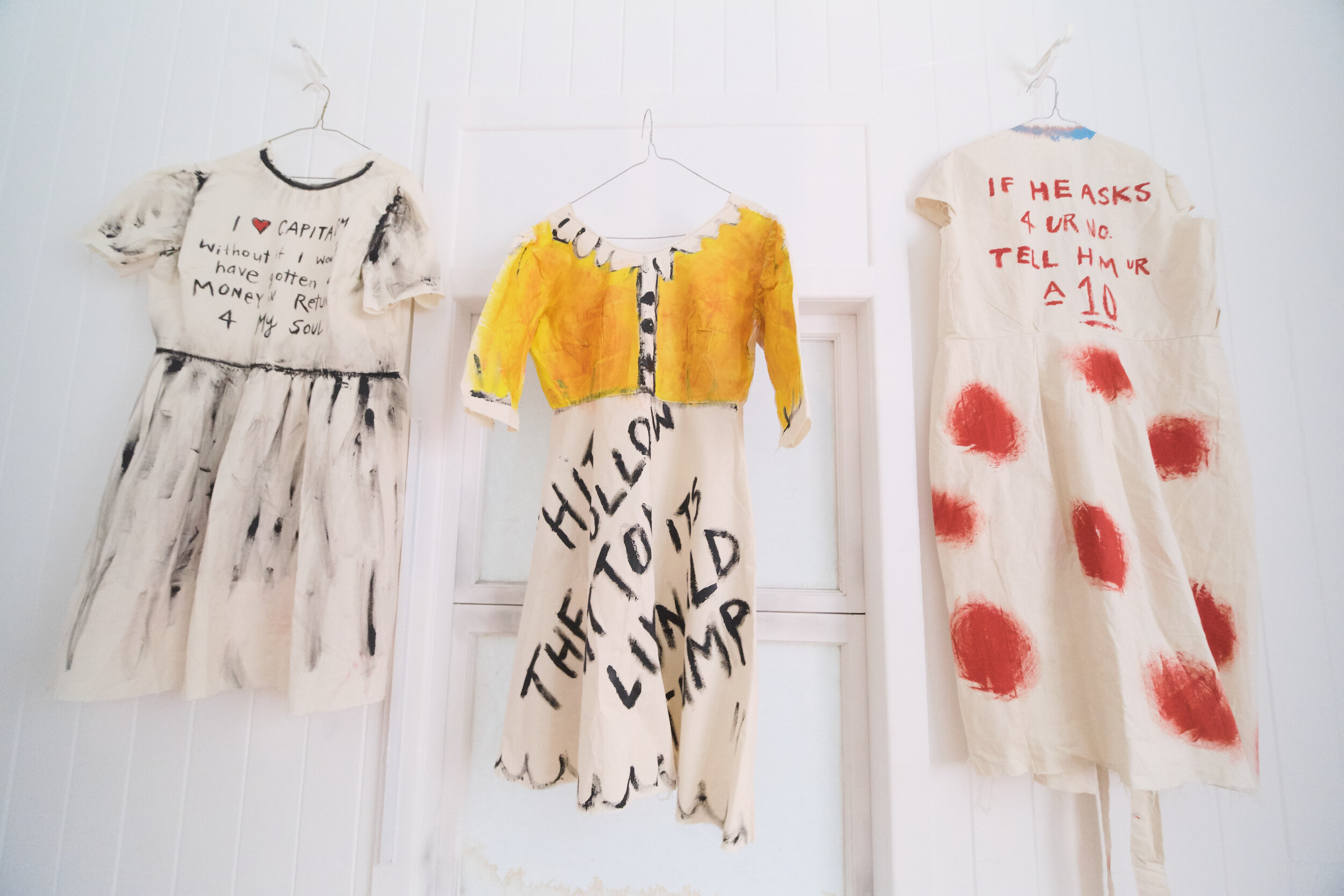
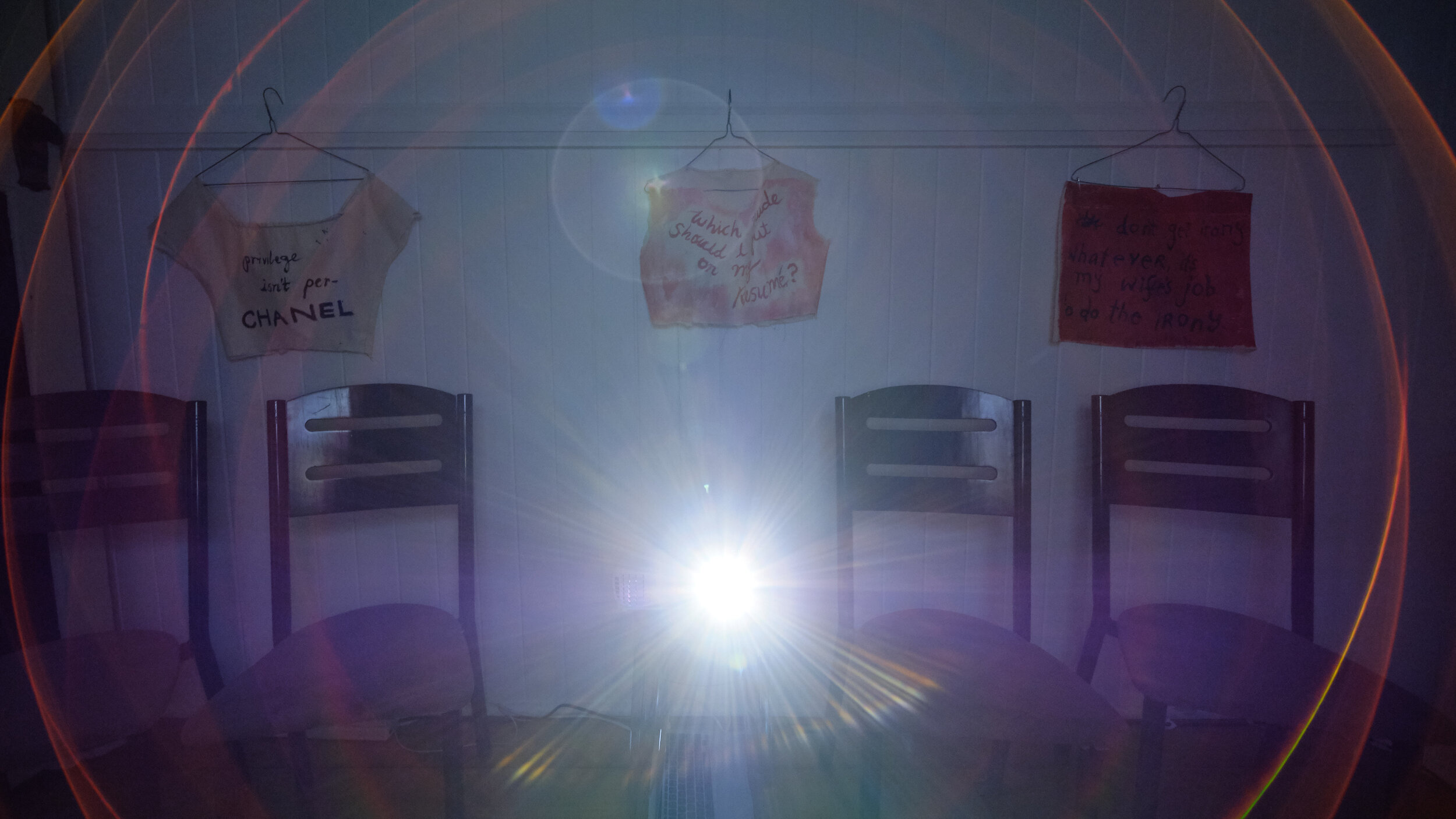
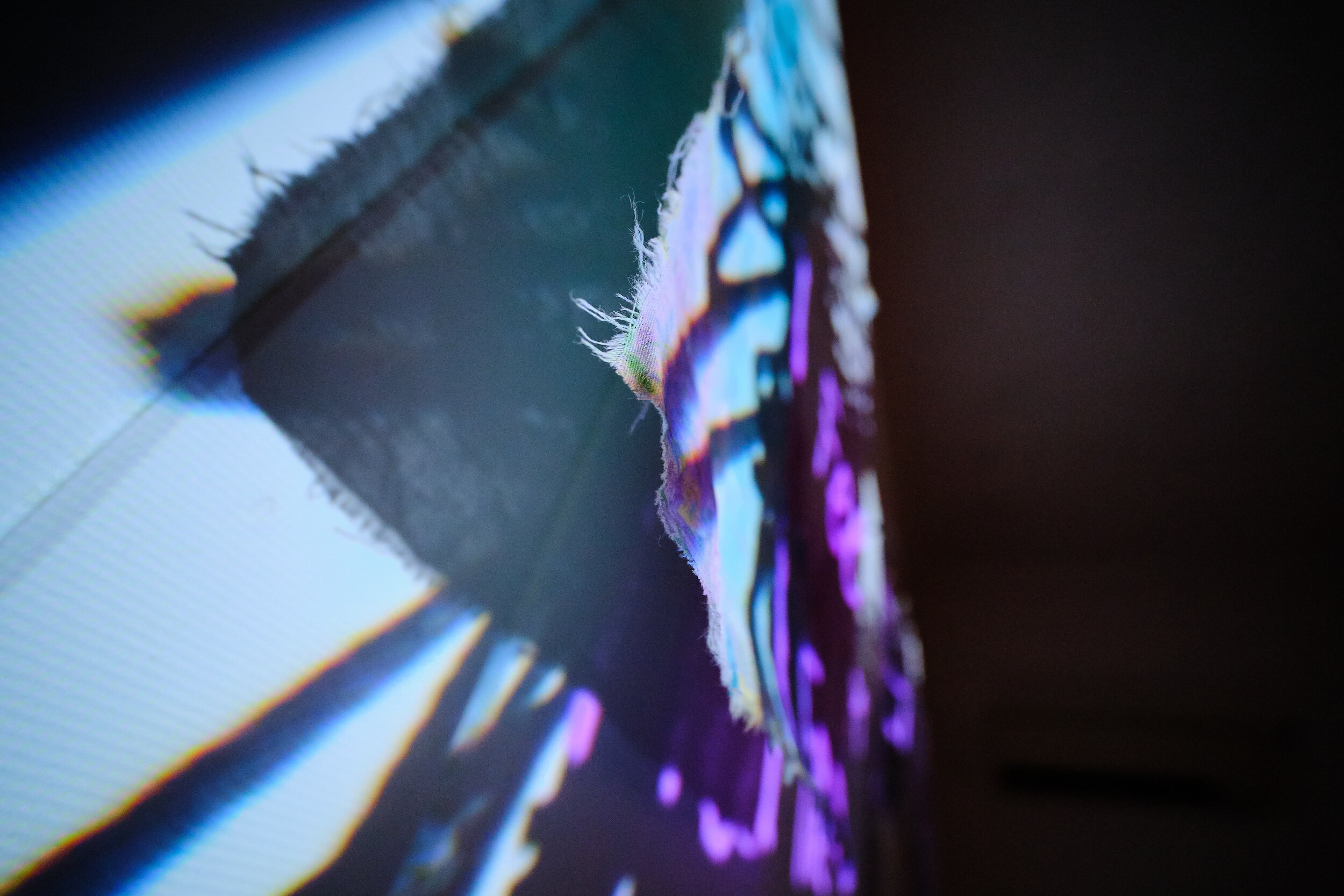
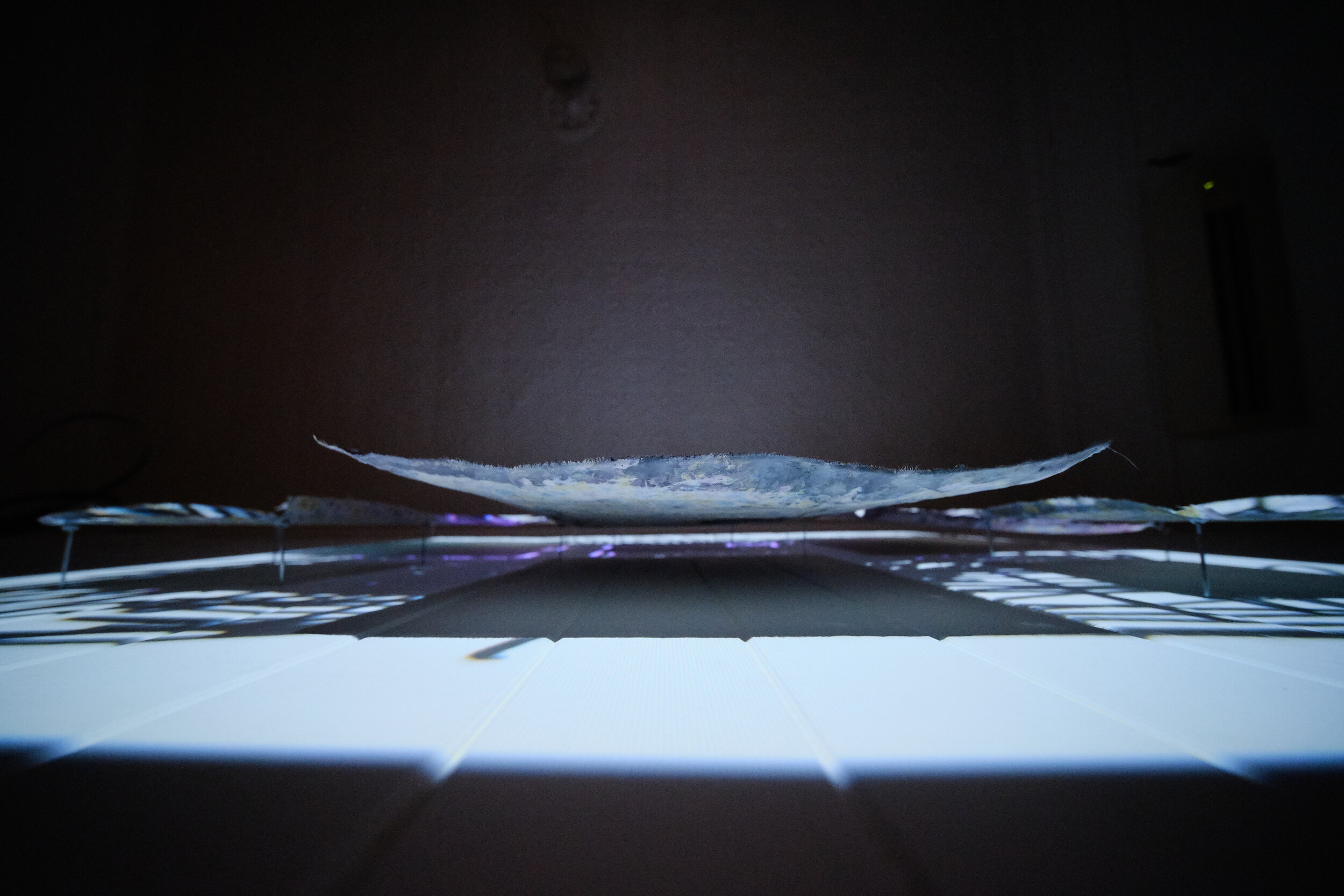
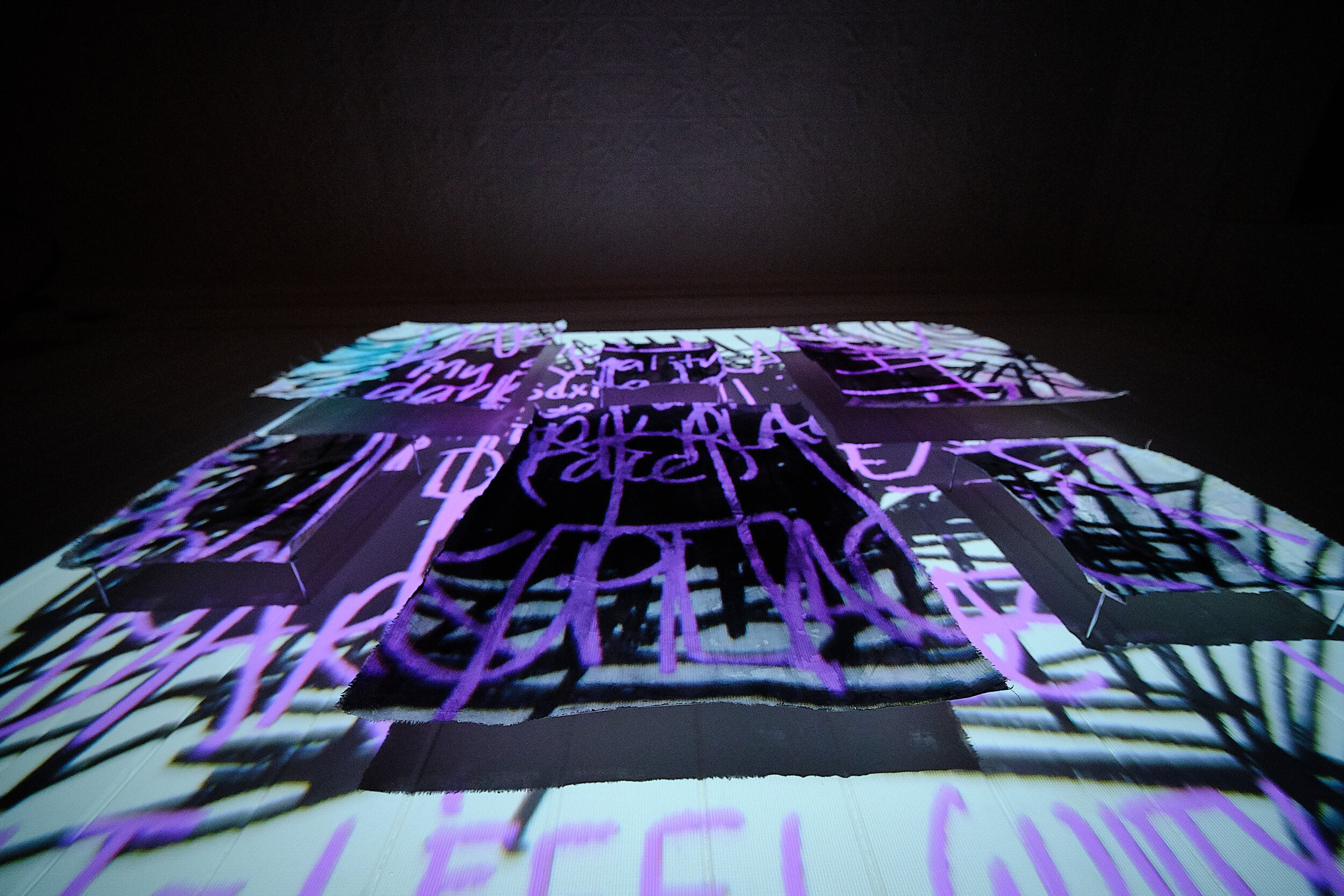
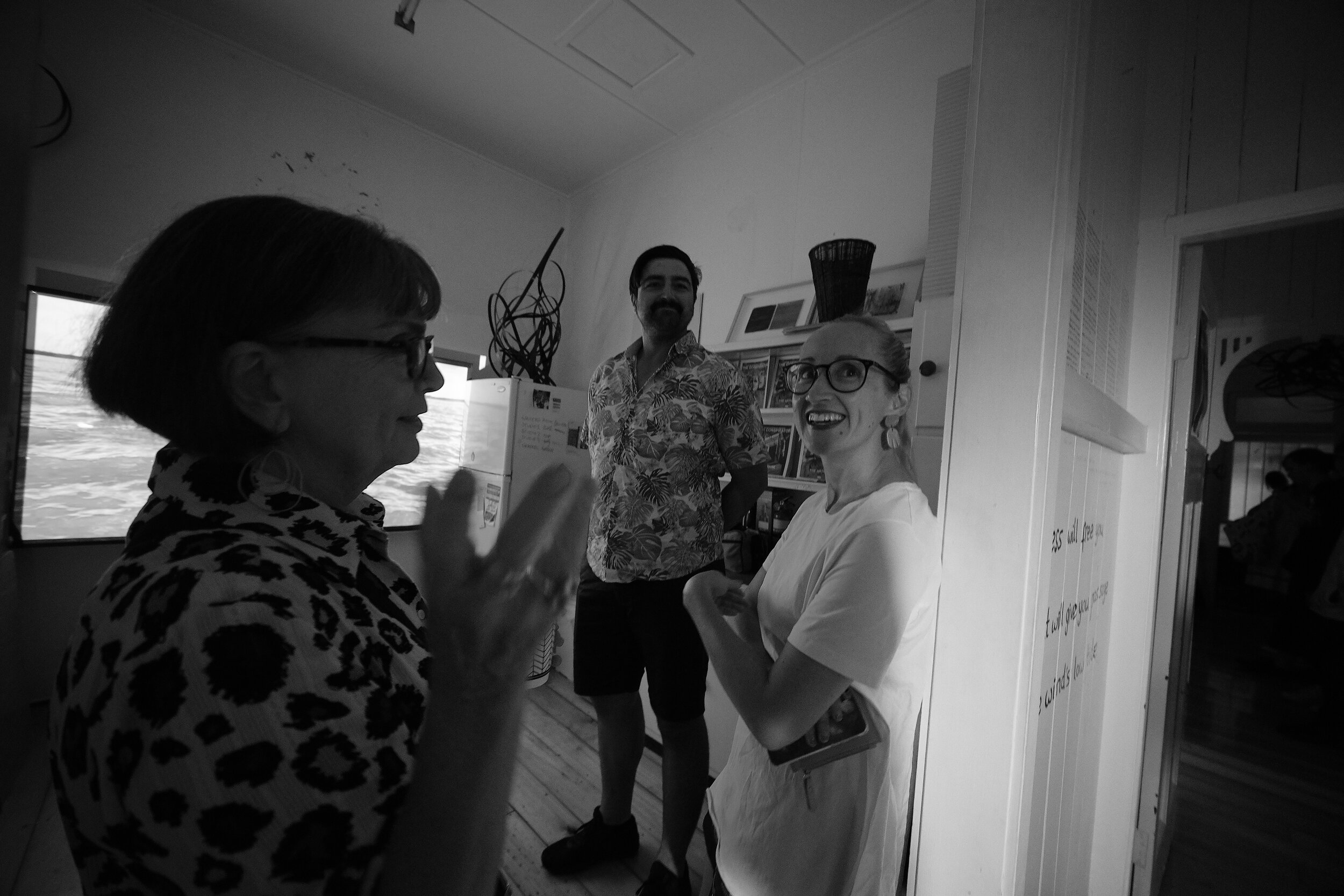
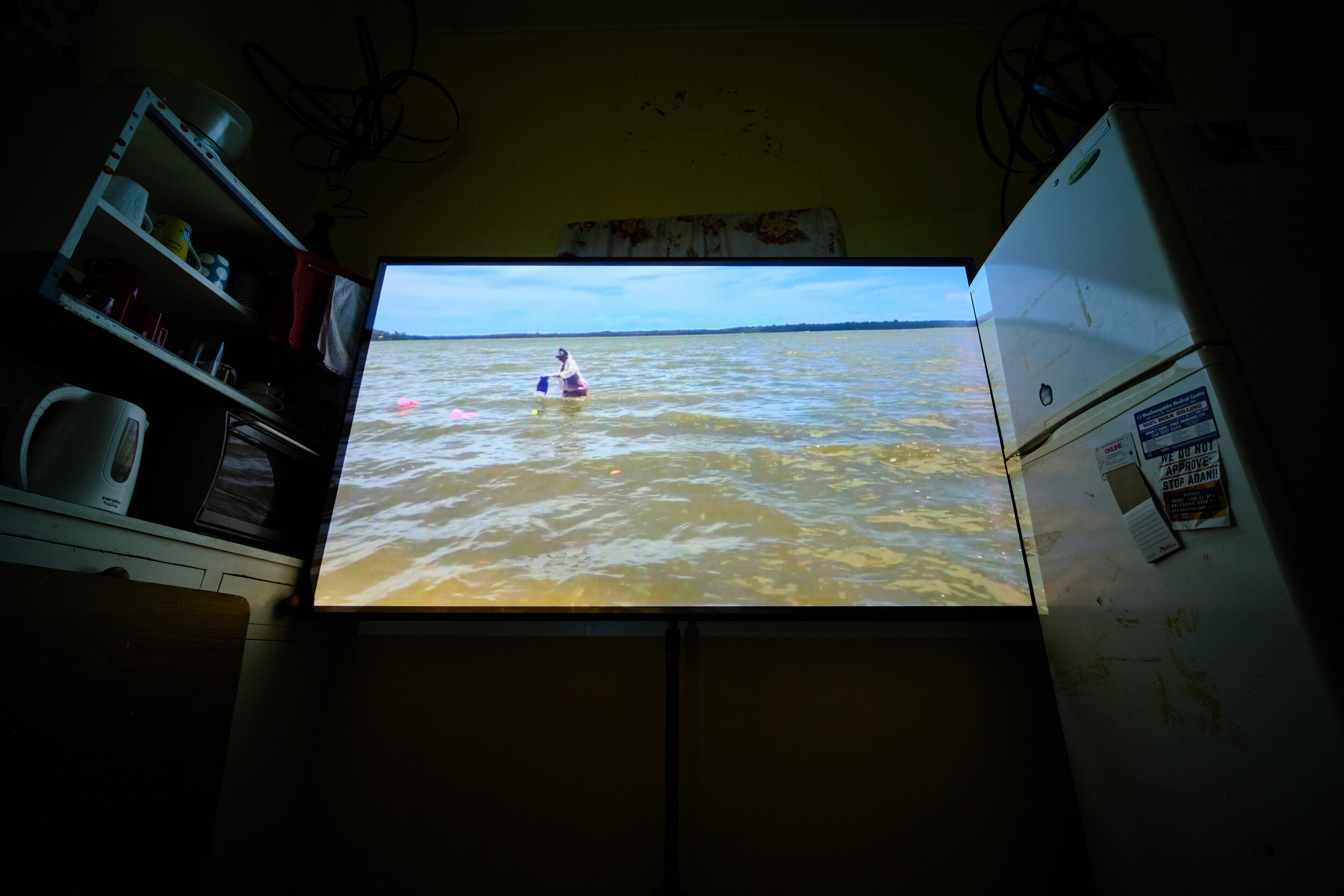
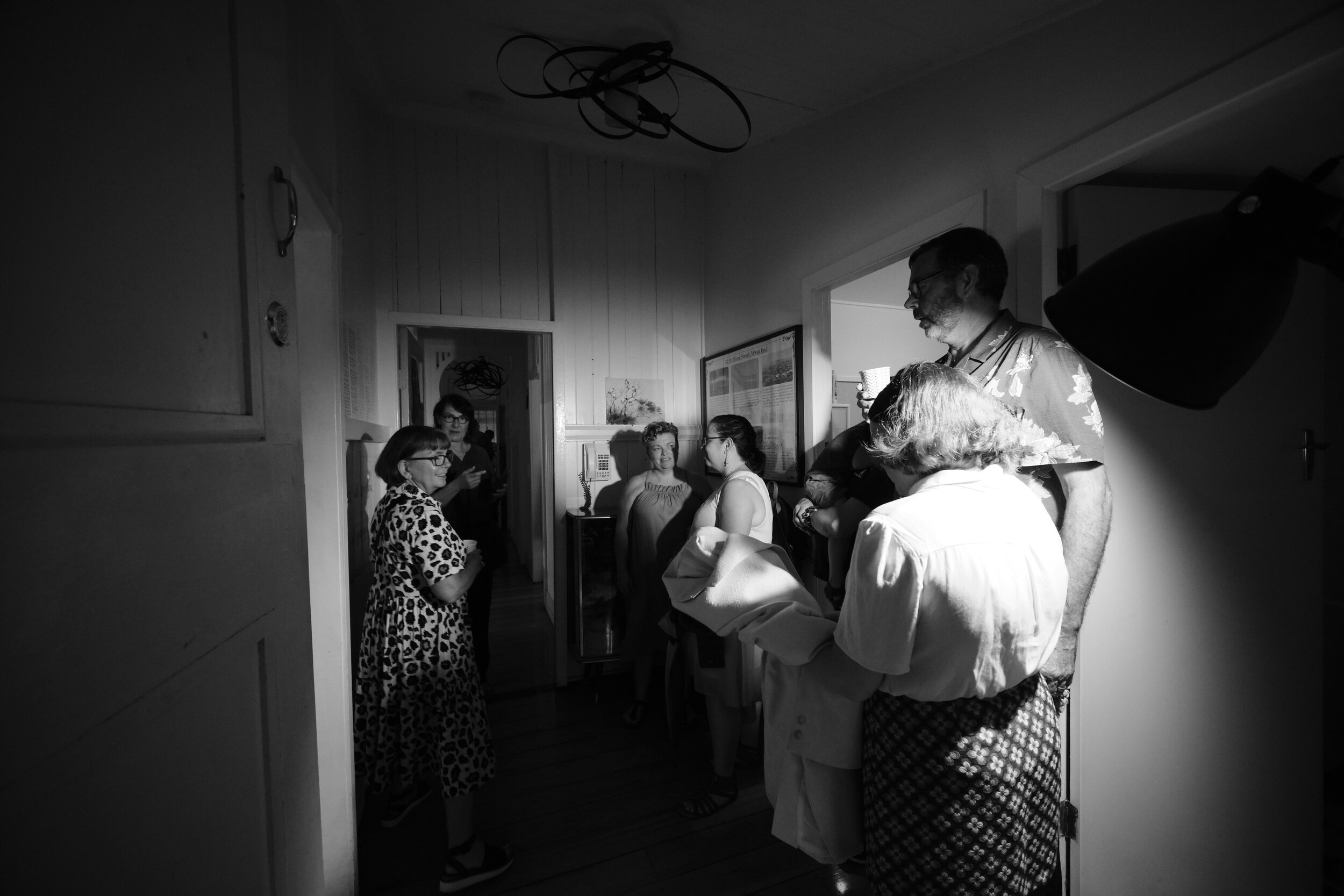
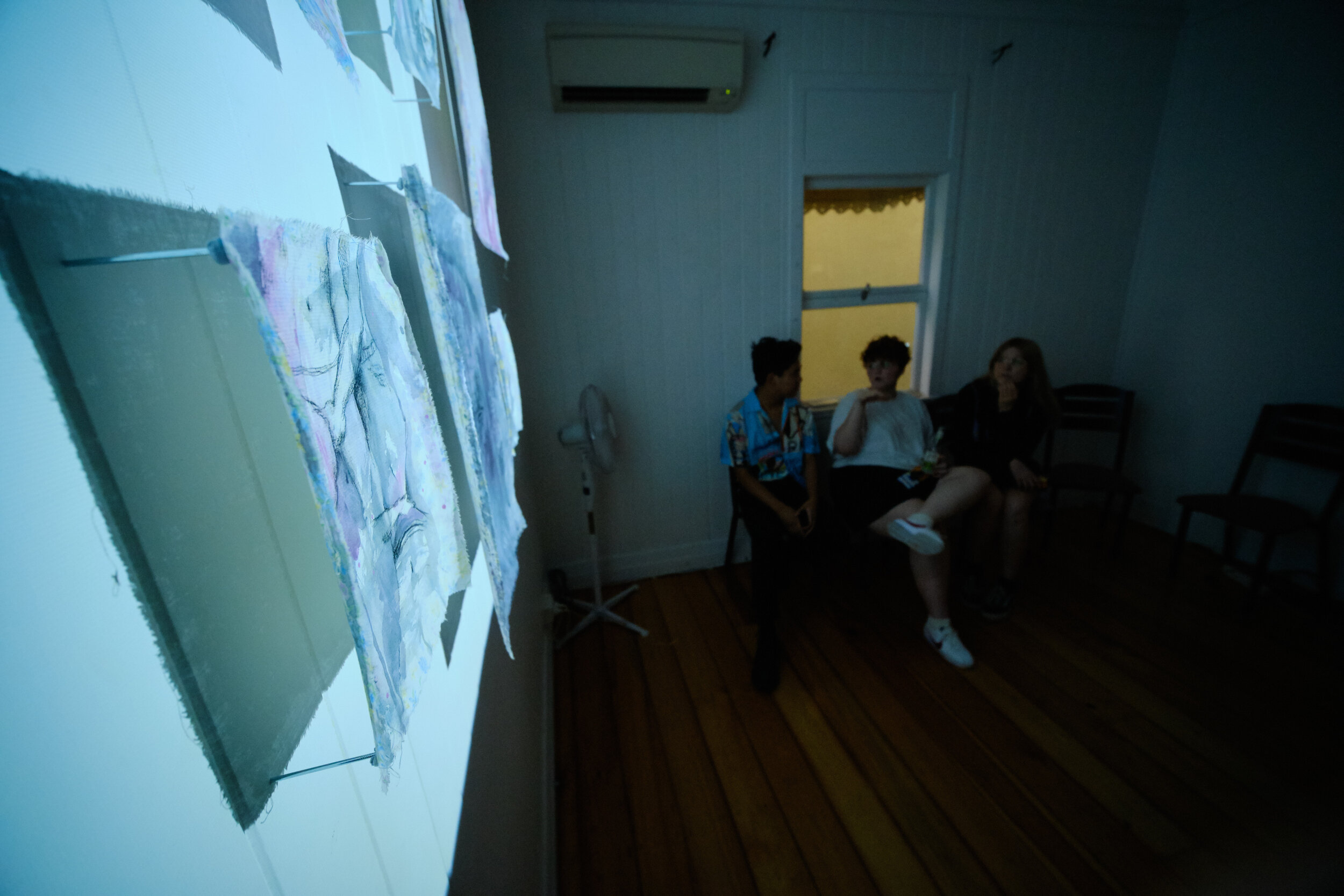
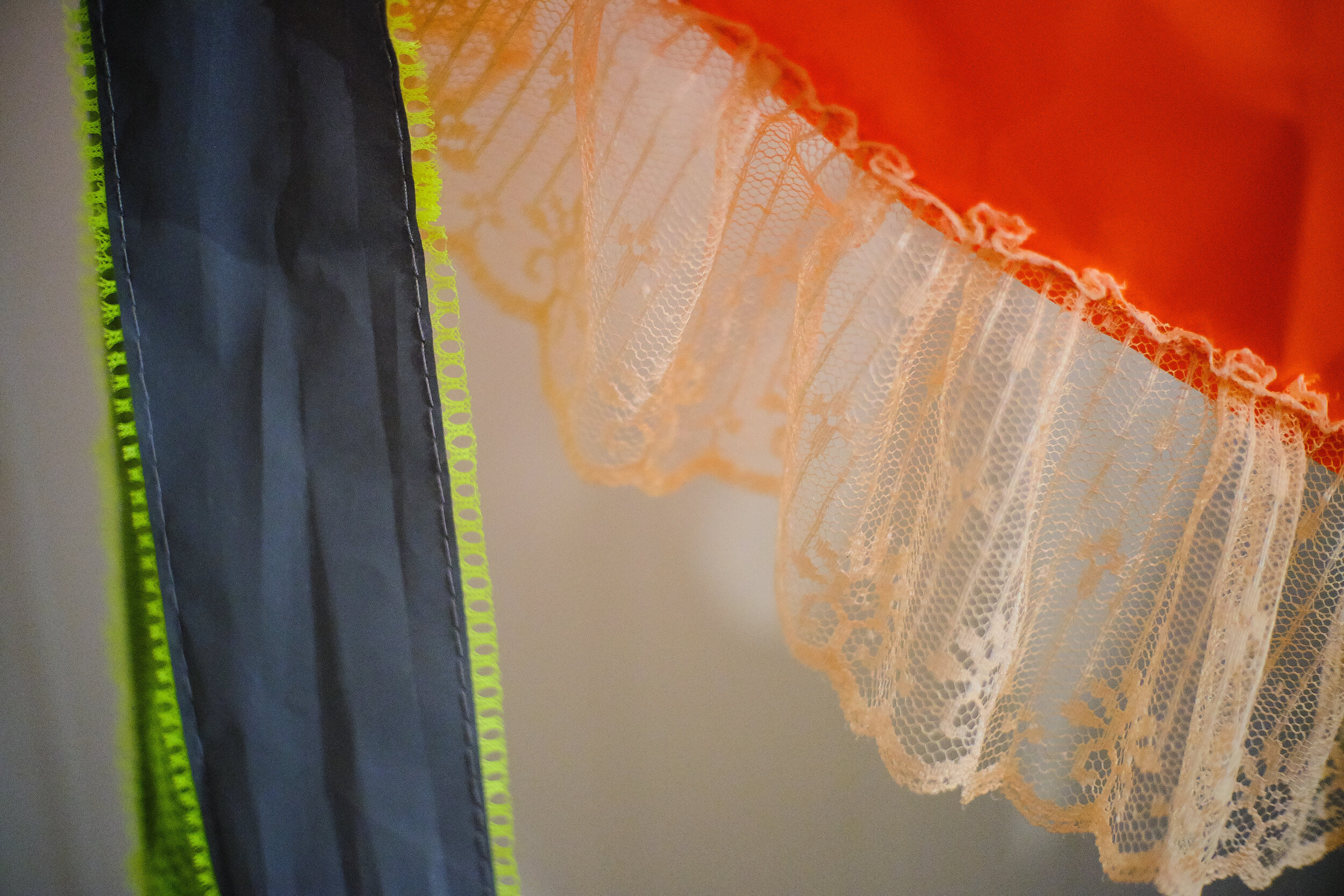
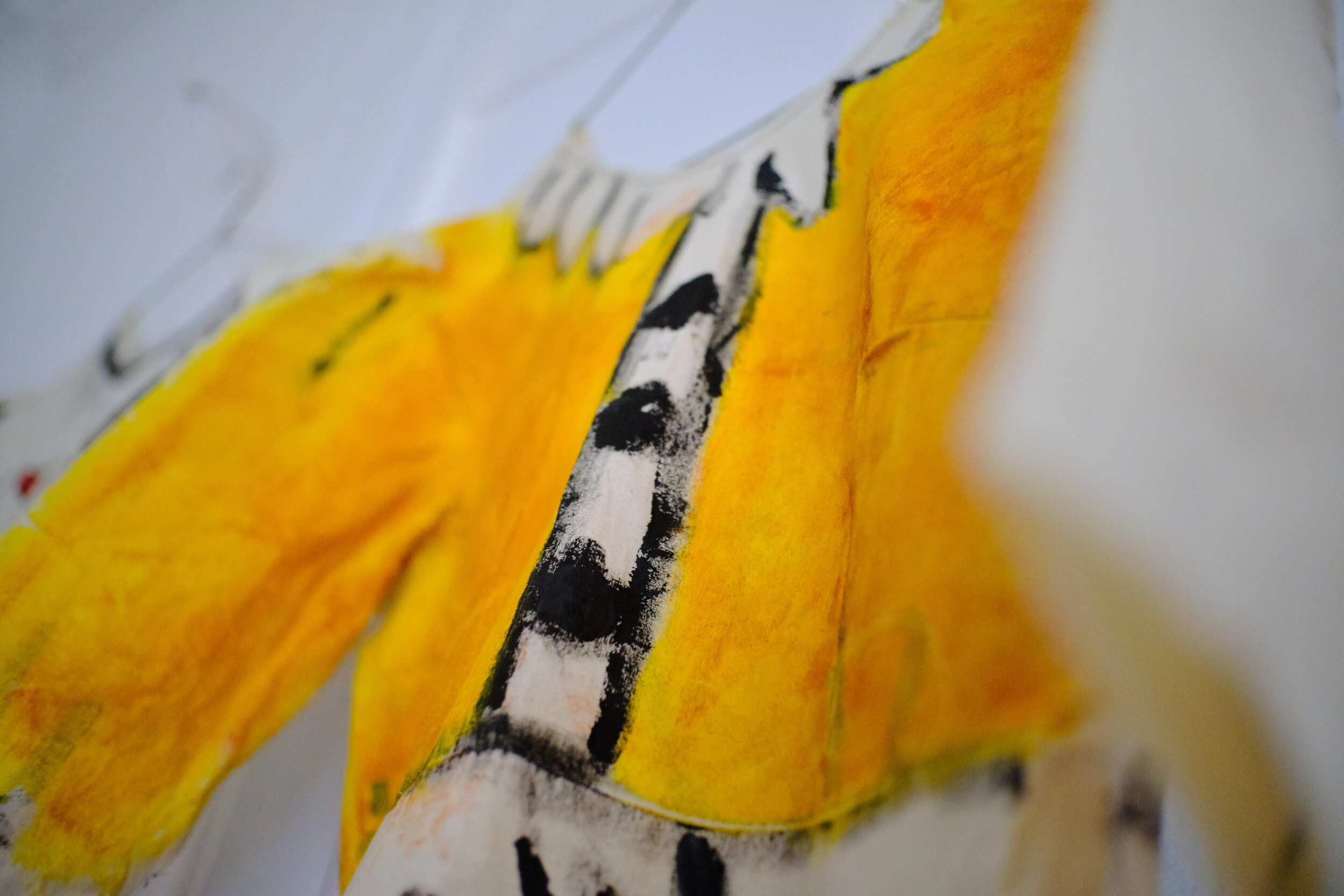
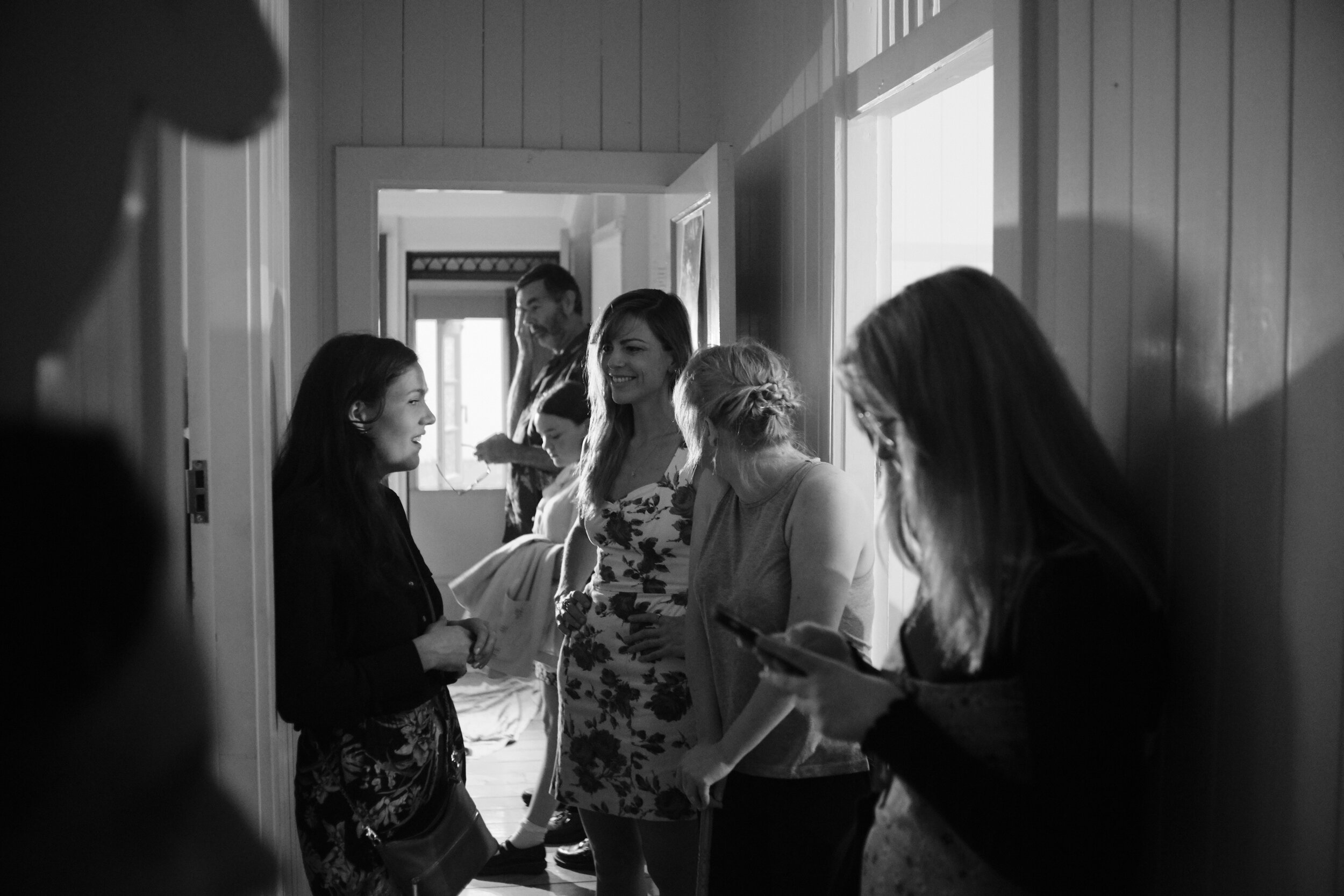
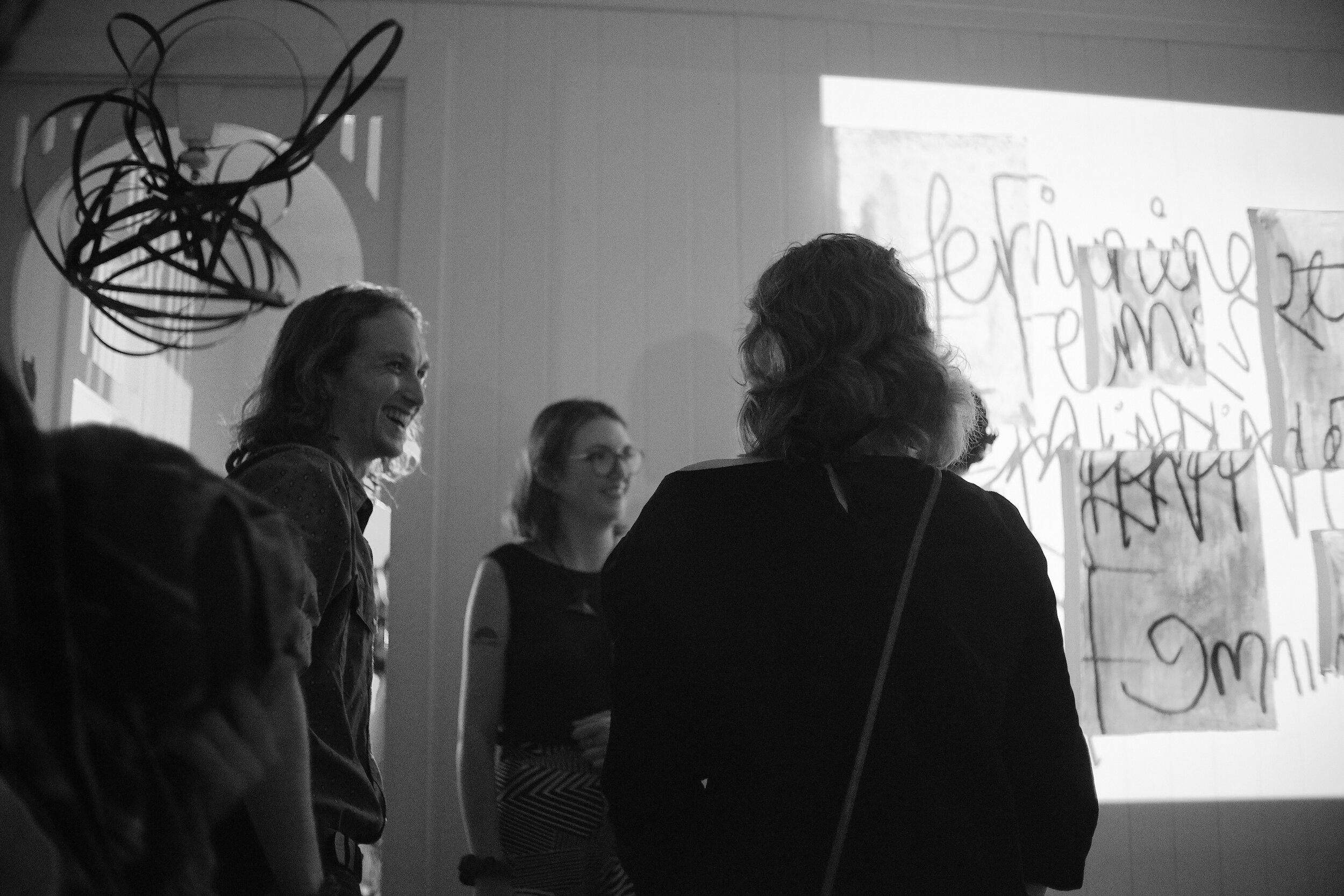
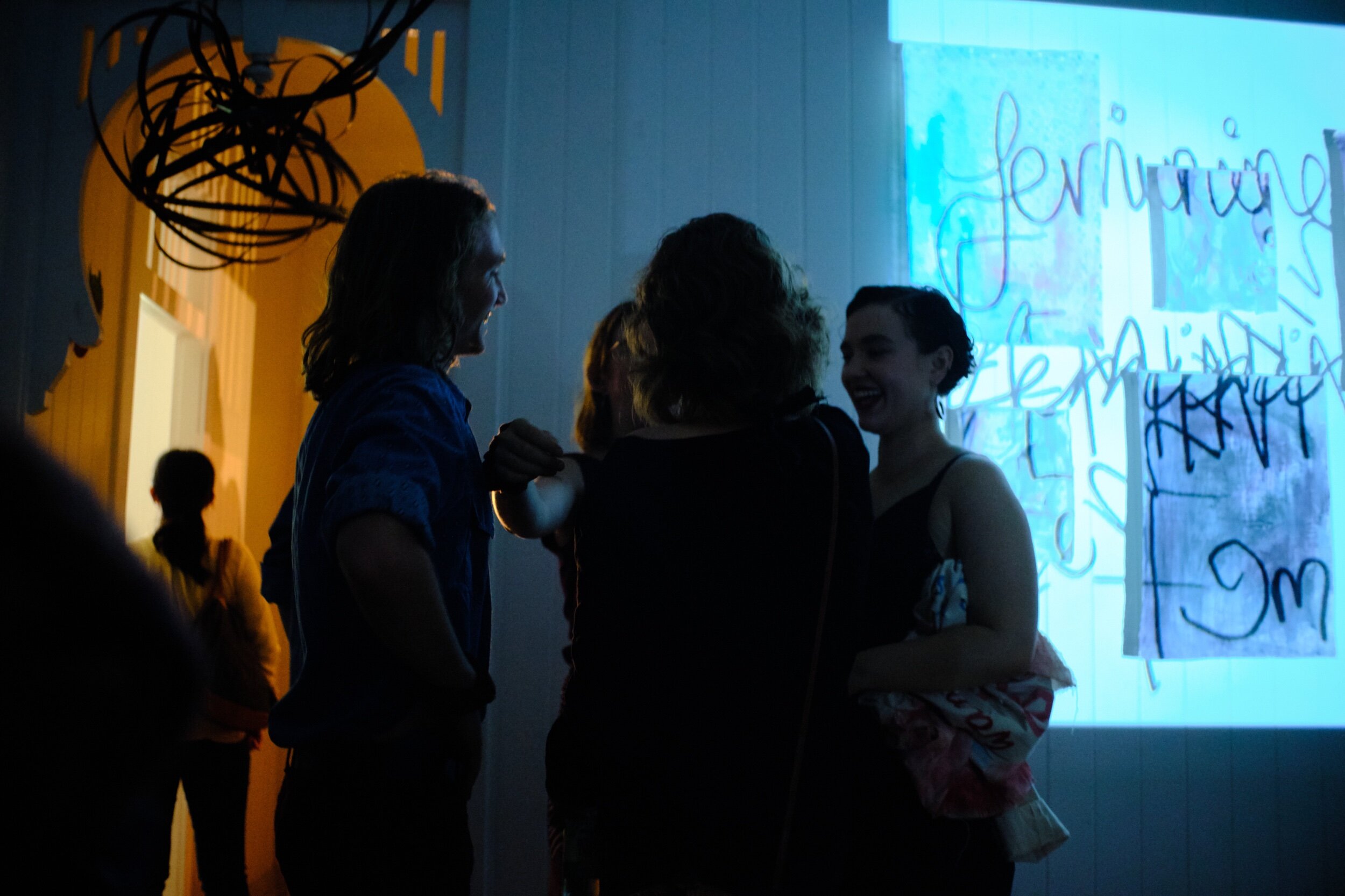
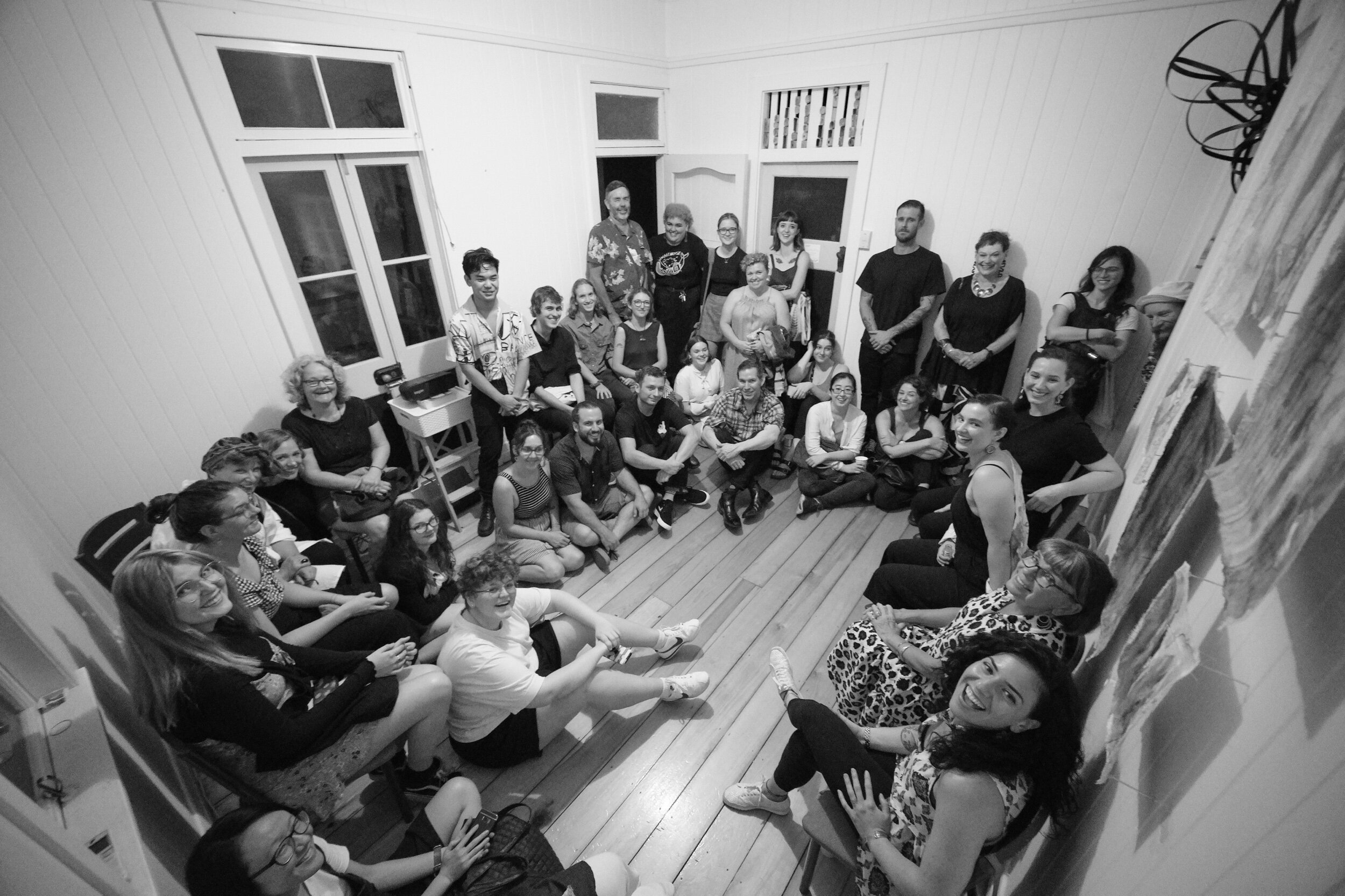
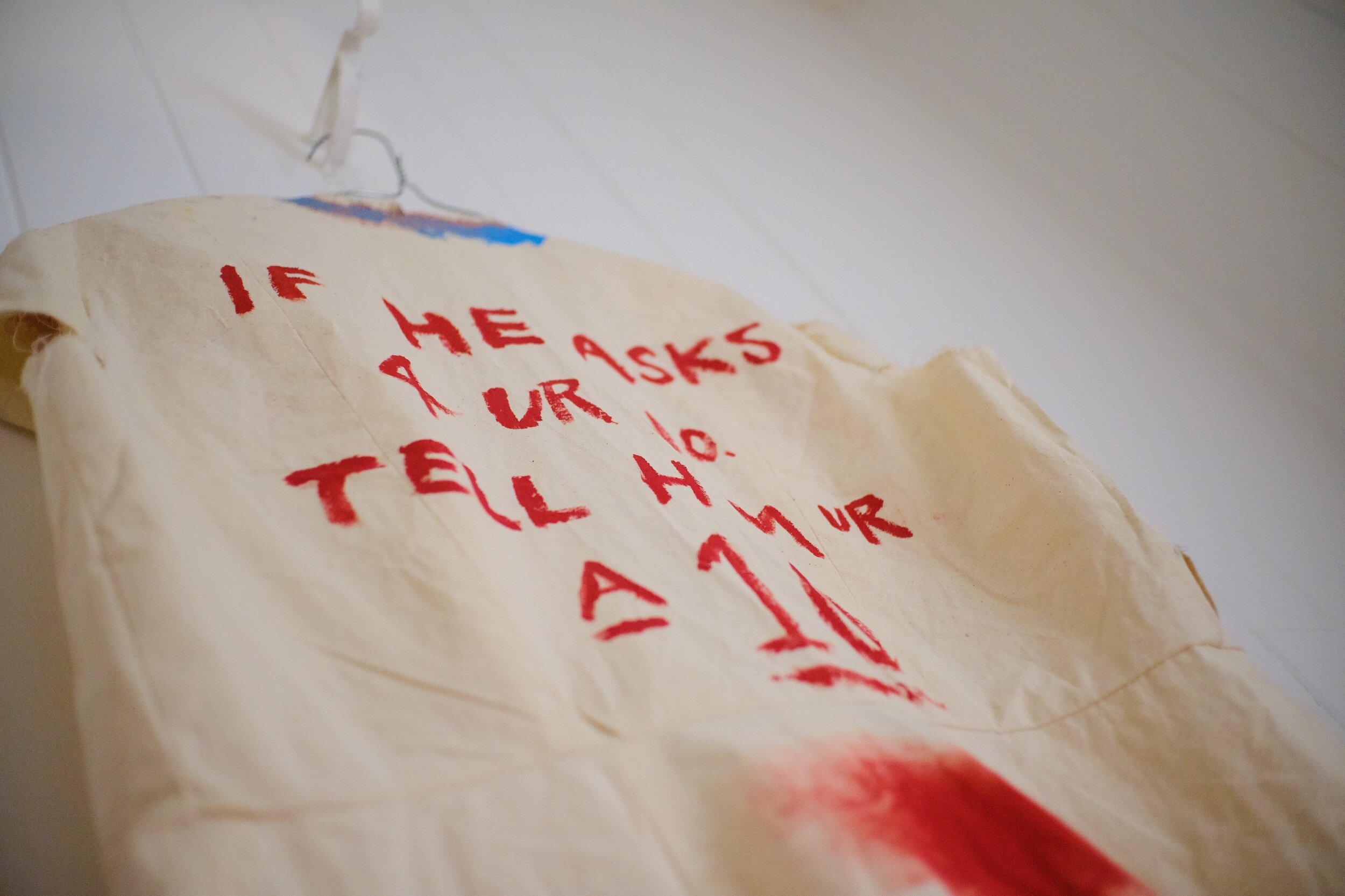
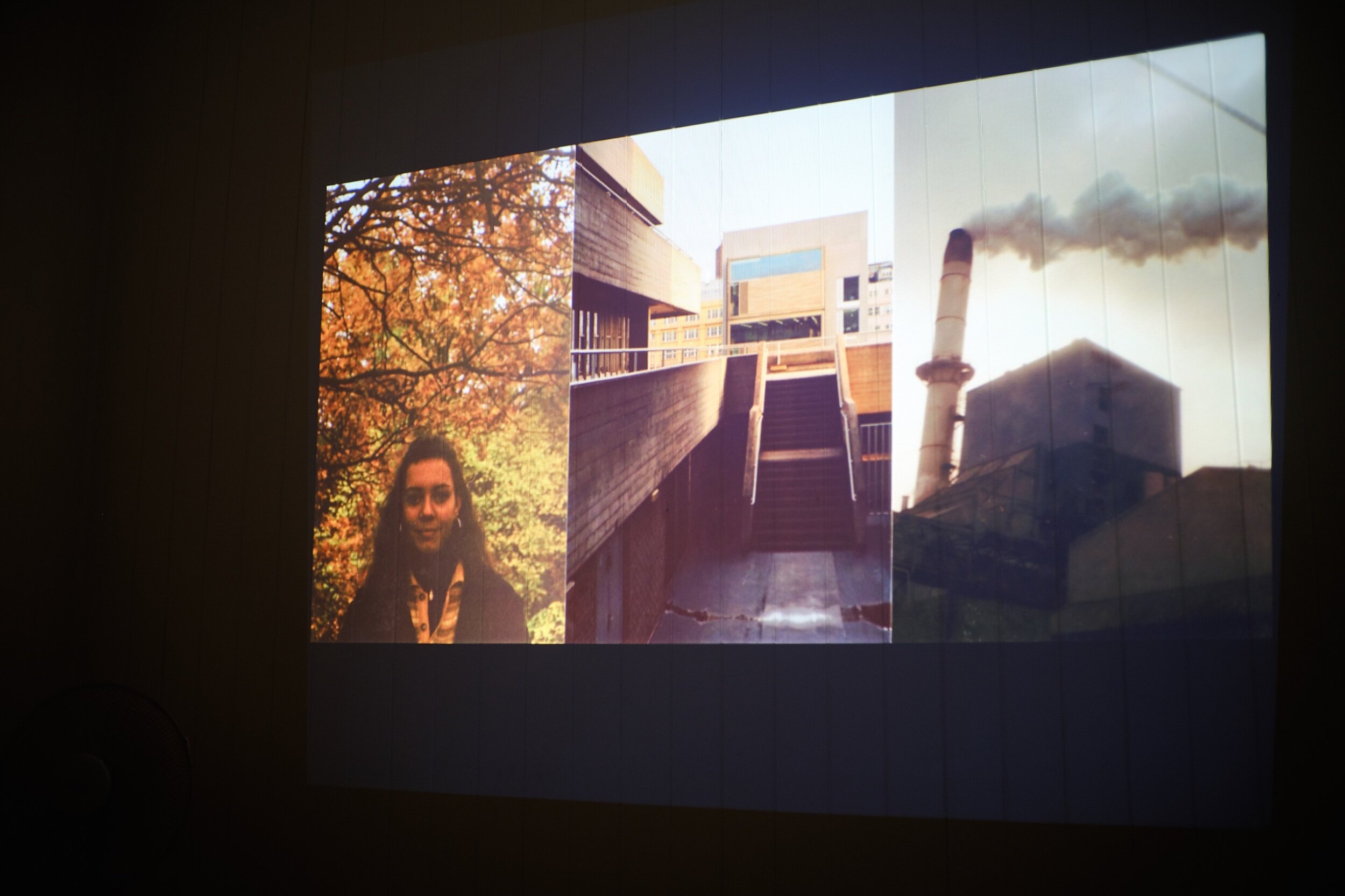
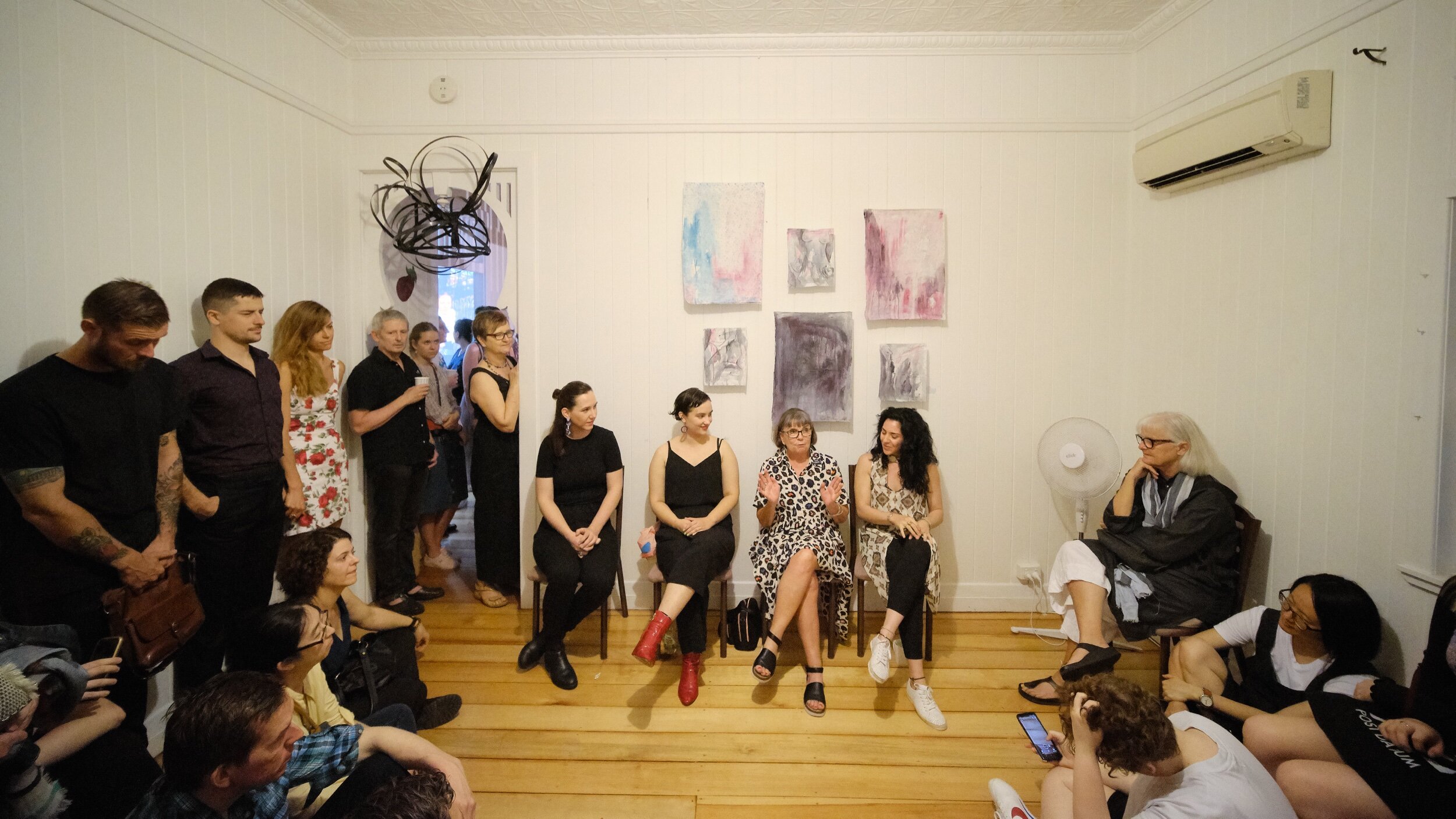
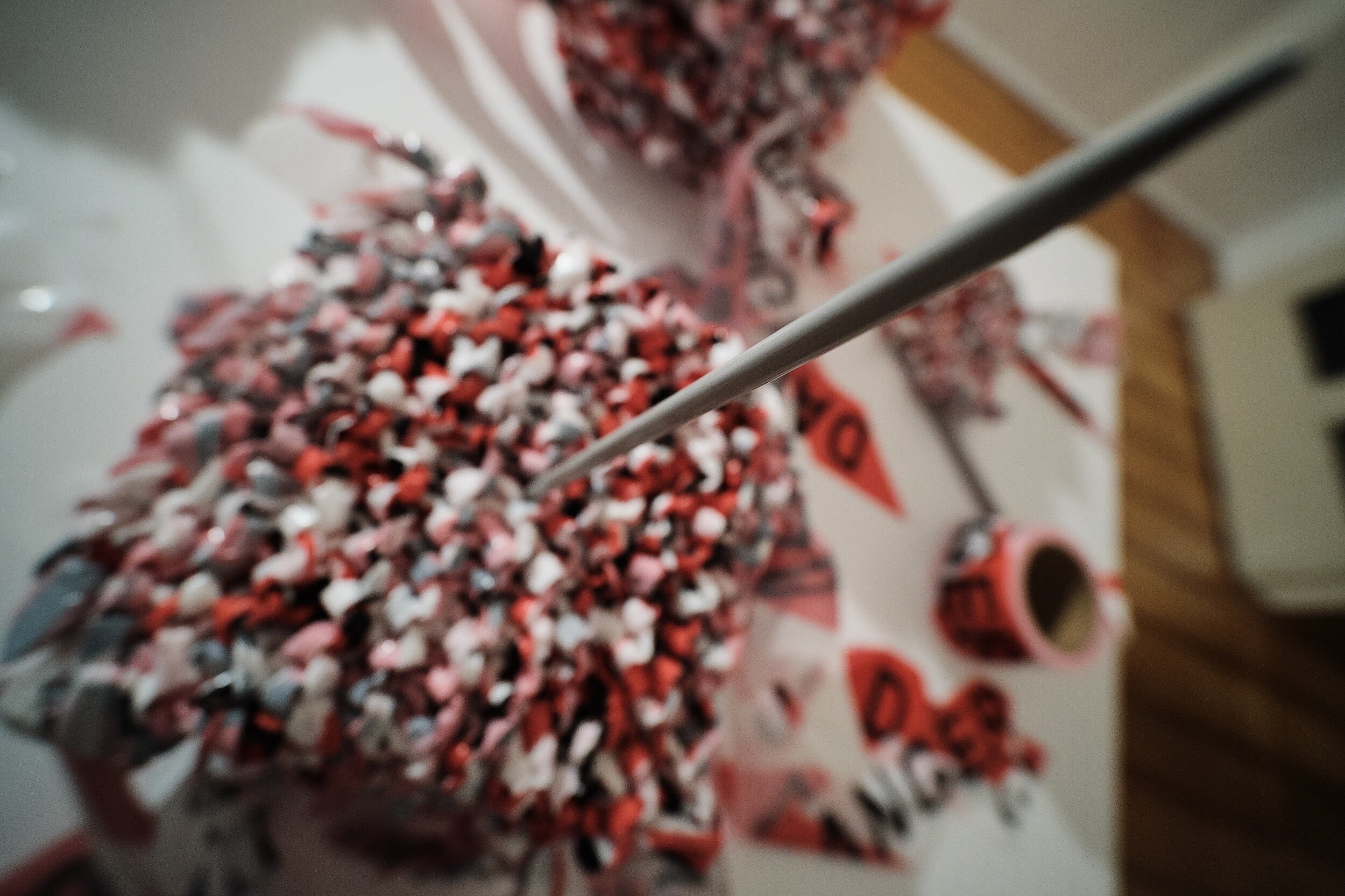
Photos by Joseph Lynch, Perception Productions
MEET THE ARTISTS!
click on images to learn more about the artists
CREDITS:
Click on Names for Profiles
Artist in Residence: Deborah Eddy
Partner Artist: Ruby Barnsley
Partner Artist: Rebecca Piper
Showcase Writer: Federica Caso, Chloe Marston
Co-creative Producers: Ella Callander, Joaquin Gonzales
Documentation Photography: Joseph Lynch
